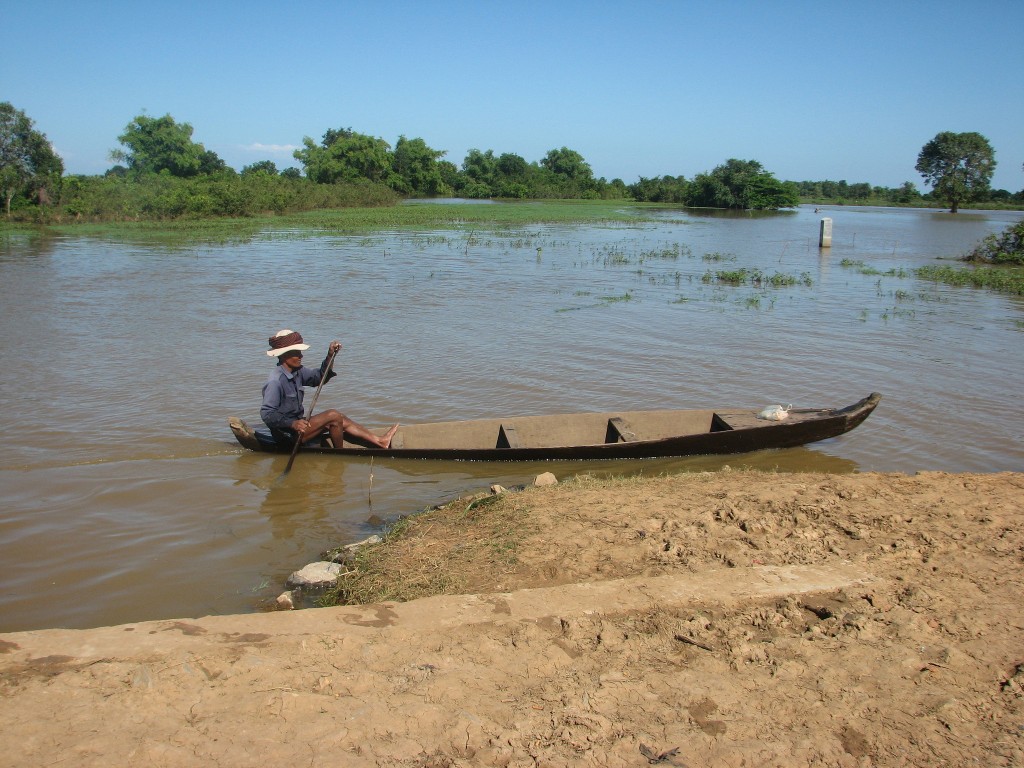
សហគមន៍នេសាទ ក្នុងខេត្តបាត់ដំបង នៃប្រទេសកម្ពុជា។ រូបភាព ថតដោយ Alan Brooks/World Fish, ២ វិច្ឆិការ ២០១១។ ក្រោមអាជ្ញាប័ណ្ណ CC BY-NC-ND 2.0។
ការនេសាទនៅកម្ពុជា ត្រូវបានបែងចែកជាបីប្រភេទ៖ ខ្នាតតូច ខ្នាតមធ្យម និង ខ្នាតធំ ឬអាជីវកម្ម។
នៅឆ្នាំ២០០១ ជាសនិទានភាពក្នុងការដោះស្រាយការនេសាទត្រីហួសកម្រិត និងជម្លោះរវាងអ្នកនេសាទខ្នាតតូច និងអ្នកនេសាទខ្នាតធំ រដ្ឋាភិបាលបានធ្វើកំណែទម្រង់លើការគ្រប់គ្រង និងនិយ័តកម្មជលផលរបស់ខ្លួន។ វិធានការនេះត្រូវអនុវត្តជាពីរដំណាក់កាល។ លើកទីមួយ នៅឆ្នាំ២០០១ ឡូតិ៍នេសាទ ៥៦% ដែលពីមុនត្រូវបានបែងចែកសម្រាប់ឯកជន ត្រូវបានកំណត់ថាជាកន្លែងនេសាទបម្រុង។ បន្ទាប់មកនៅឆ្នាំ ២០១២ ឡូតិ៍នេសាទទាំងអស់ត្រូវបានបិទ ហើយសិទ្ធិត្រូវបានផ្តល់ដល់ប្រជាជនកម្ពុជា ដើម្បីគ្រប់គ្រងធនធានជលផលធម្មជាតិក្នុងតំបន់របស់ពួកគេ តាមរយៈការបង្កើតជាសហគមន៍នេសាទ។1
ការគ្រប់គ្រងជលផលបច្ចុប្បន្ន ប្រឈមនឹងបញ្ហាជាច្រើនពាក់ព័ន្ធនឹងបញ្ហាអភិបាលកិច្ច។ កង្វះការចូលរួមពីសហគមន៍ ត្រូវបានមើលឃើញថាជាបញ្ហាមួយក្នុងការអភិរក្សធនធានជលផល។ ទោះបីជាមានការផ្តល់ដែននេសាទសម្រាប់ឱ្យសហគមន៍ប្រើប្រាស់ក្តី ការនេសាទខុសច្បាប់ និងជម្លោះនៅតែបន្តក្លាយជាបញ្ហាប្រឈម។2
ការបង្កើតសហគមន៍នេសាទ ជាឧបករណ៍មួយដែលអាចកែលម្អការគ្រប់គ្រងជលផល និងធានាសន្តិសុខស្បៀងក្នុងស្រុក ត្រូវបានអនុវត្តឡើងនៅកម្ពុជាកាលពីអំឡុងទសវត្សរ៍ឆ្នាំ១៩៩០។ យោងតាម របាយការណ៍ប្រចាំឆ្នាំ២០១៤ របស់ក្រសួងកសិកម្ម ប្រទេសកម្ពុជា មានសហគមន៍នេសាទចំនួន ៥១៦ ដែលក្នុងនោះ សហគមន៍នេសាទទឹកសាបមាន៤៧៧ សហគមន៍នេសាទទឹកប្រៃមាន៣៩។ សហគមន៍នេសាទចំនួន ៣៧០ ត្រូវបានទទួលស្គាល់ដោយក្រសួងកសិកម្ម ខណៈដែលសហគមន៍ចំនួន ១៤ ផ្សេងទៀត កំពុងស្ថិតក្នុងសំណើសុំចុះបញ្ជី ហើយក្រៅពីនេះសហគមន៍ចំនួន ២៣ កំពុងស្ថិតក្នុងដំណើរការអនុម័តនៅថ្នាក់ក្រោមជាតិ។3 ប្រការសំខាន់នោះគឺ សហគមន៍នេសាទមួយចំនួន មិនទាន់បានការទទួលស្គាល់ពីអាជ្ញាធរមូលដ្ឋានឡើយ។
យោងតាម ច្បាប់ស្តីពីជលផលឆ្នាំ២០០៦ បានចែងថាសហគមន៍នេសាទ សំដៅដល់ដែននេសាទរបស់រដ្ឋដែលបានប្រគល់ជូនសហគមន៍ ក្រោមកិច្ចព្រមព្រៀងរវាងនាយខណ្ឌរដ្ឋបាលជលផលជាមួយសហគមន៍ ឬក្រុមប្រជាពលរដ្ឋរស់នៅក្នុង ឬក្បែរដែននេសាទដែលពឹងផ្អែកលើការធ្វើនេសាទសម្រាប់ការចិញ្ចឹមជីវិត និងការប្រើប្រាស់ជាប្រពៃណី ហើយដែលធ្វើការគ្រប់គ្រង ឬប្រើប្រាស់កន្លែងនេសាទនោះប្រកបដោយនិរន្តរភាព។4
ក្នុងឆ្នាំ២០០៧ រដ្ឋាភិបាលកម្ពុជាបានចេញ អនុក្រឹត្យស្តីពីការគ្រប់គ្រងសហគមន៍នេសាទ ដើម្បីចែងពីវិធានសម្រាប់ការបង្កើត ការគ្រប់គ្រង និងការប្រើប្រាស់សហគមន៍នេសាទនៅកម្ពុជា។ មានតែមធ្យោបាយនេសាទខ្នាតតូចប៉ុណ្ណោះដែលអាចប្រើប្រាស់ក្នុងសហគមន៍នេសាទបាន។ តាមច្បាប់ សហគមន៍នេសាទ ត្រូវស្ថិតក្រោមយុត្តាធិការទូទៅរបស់ ក្រសួងកសិកម្ម រុក្ខាប្រមាញ់ និងនេសាទ។
ទោះបីជាមានវឌ្ឍនភាពគួរឲ្យកត់សម្គាល់ក៏ដោយ ក៏សហគមន៍នេសាទ នៅតែប្រឈមនឹងបញ្ហាមួយចំនួន ដូចជា កង្វះការអនុវត្តច្បាប់សមស្រប និងកង្វះសមត្ថភាព ការលើកទឹកចិត្ត និងប្រាក់ចំណូលសម្រាប់សមាជិកសហគមន៍ដែលចូលរួមយ៉ាងសកម្មក្នុងការគ្រប់គ្រងសហគមន៍នេសាទប្រកបដោយនិរន្តរភាព។5
បានធ្វើបច្ចុប្បន្នភាព៖ ៣០ កញ្ញា ២០១៥
ទាក់ទងនឹងសហគមន៍នេសាទ
- កសិកម្ម និងការនេសាទ
- គោលនយោបាយ និងការគ្រប់គ្រងការនេសាទ
- គោលនយោបាយ និងការគ្រប់គ្រងបរិស្ថាន និងធនធានធម្មជាតិ
ឯកសារយោង
- 1. កង ឃីម. ២០១៣. “កម្មសិទ្ធិជលផលនៅកម្ពុជា ៖ ករណីកម្មសិទ្ធិរបស់សហគមន៍នេសាទ” បទបង្ហាញនៅក្នុង សិក្ខាសាលាស្តីពីការលើកកំពស់ការយល់ដឹងអំពីគោលការណ៍ណែនាំស្តីពីអភិបាលកិច្ចដែលមានទំនួលខុសត្រូវលើការកាន់កាប់ដីធ្លី នេសាទ និងព្រៃឈើ ក្នុងបរិបទសន្ដិសុខស្បៀងអាហារជាតិ, ទីក្រុងបាងកក, ប្រទេសថៃ, ខែសីហា ឆ្នាំ ២០១៣. http://www.fao.org/fileadmin/templates/rap/files/meetings/2013/130814-tenure-02.pdf.
- 2. “នេសាទ.” ក្រុមប្រឹក្សាអភិវឌ្ឍន៍កម្ពុជា. ដកស្រង់ ១ កញ្ញា ២០១៥. http://www.cdc-crdb.gov.kh/cdc/ngo_statement/fisheries.htm.
- 3. ក្រសួងកសិកម្ម រុក្ខាប្រមាញ់ និងនេសាទ. របាយការណ៍ប្រចាំឆ្នាំ២០១៤ និងផែនការសកម្មភាពសម្រាប់ឆ្នាំ២០១៥. ភ្នំពេញ៖ ក្រសួងកសិកម្ម រុក្ខាប្រមាញ់ និងនេសាទ. ដកស្រង់ ១០ មិថុនា ២០១៥. https://server2.maff.gov.kh/parse/files/myAppId5hD7ypUYw61sTqML/96998f6f93549c6389810059579f0083_1503018702.pdf
- 4. ច្បាប់ស្តីពីជលផល ឆ្នាំ ២០០៦ ឧបសម្ព័ន្ធ។
- 5. “នេសាទ.” ក្រុមប្រឹក្សាអភិវឌ្ឍន៍កម្ពុជា. ដកស្រង់ ១ កញ្ញា ២០១៥. http://www.cdc-crdb.gov.kh/cdc/ngo_statement/fisheries.htm.

